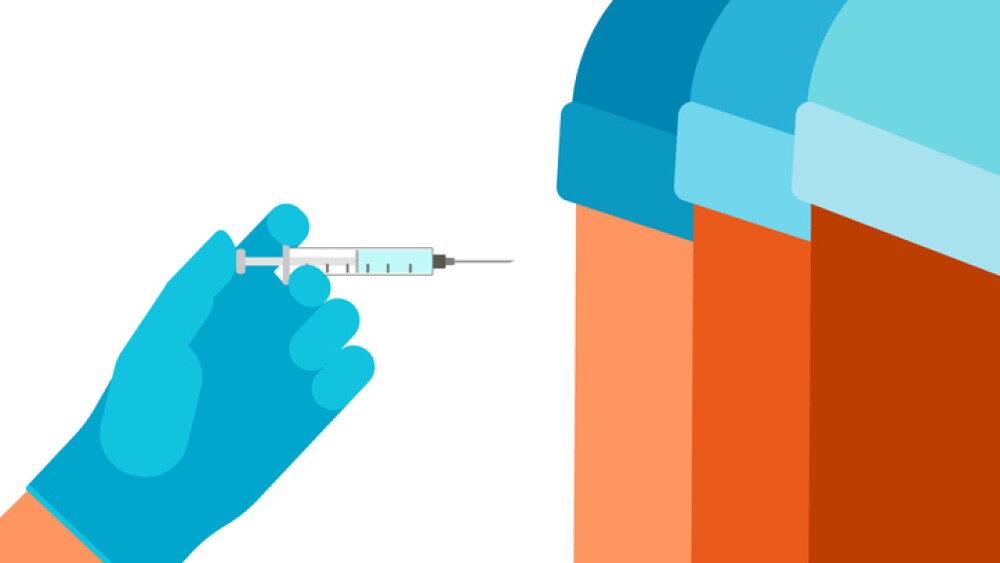Arcus Biosciences, Inc. (NYSE:RCUS), today announced that, at the first interim analysis of the three-arm randomized Phase 2 ARC-7 study, both arms with domvanalimab-based combinations showed encouraging clinical activity (measured by overall response rate; ORR) when given as an initial treatment (first-line) to people with metastatic, PD-L1≥50% non-small cell lung cancer (NSCLC).
- ARC-7 and the ongoing ARC-10 Phase 3 registrational study will continue to enroll as planned, and preparations for additional Phase 3 studies are underway for domvanalimab-based combinations across various cancer types
- Zimberelimab monotherapy showed activity similar to that of marketed anti-PD-1 antibodies studied in this setting
- At time of data cut off, no unexpected safety signals were observed in the ARC-7 study
- Data will be submitted later this year for presentation at a medical meeting
- Gilead is anticipated to make a decision regarding opting into the Arcus anti-TIGIT program later this year
- Arcus will host a conference call today, Wednesday, June 23, 2021 at 2:00 p.m. Pacific Time/5:00 p.m. Eastern Time to provide an update on its ongoing domvanalimab program
HAYWARD, Calif.--(BUSINESS WIRE)-- Arcus Biosciences, Inc. (NYSE:RCUS), an oncology-focused biopharmaceutical company working to create best-in-class cancer therapies, today announced that, at the first interim analysis of the three-arm randomized Phase 2 ARC-7 study, both arms with domvanalimab-based combinations showed encouraging clinical activity (measured by overall response rate; ORR) when given as an initial treatment (first-line) to people with metastatic, PD-L1≥50% non-small cell lung cancer (NSCLC). The zimberelimab monotherapy arm showed activity similar to that of marketed anti-PD-1 antibodies studied by other companies in this setting. At the time of data cut off, no unexpected safety signals were observed; and the current safety profile for each arm of the study appears to be consistent with known immune checkpoint inhibitors in this setting. All three arms of the ARC-7 trial, and the ongoing ARC-10 Phase 3 registrational study, will continue to enroll as planned; and ARC-7 data will be submitted later this year for presentation at a medical conference.
Our partner Gilead Sciences has an exclusive option to co-develop and co-commercialize domvanalimab and is anticipated to make a decision regarding opting into the anti-TIGIT program later this year. Arcus and Gilead will continue preparations for additional Phase 3 studies of domvanalimab-based combinations and explore development plans for combinations including domvanalimab and etrumadenant.
“This analysis of the dataset for the ongoing ARC-7 study revealed encouraging clinical activity for the anti-TIGIT domvanalimab-based combinations, and furthermore, that the anti-PD-1 zimberelimab monotherapy arm showed activity similar to that of marketed anti-PD-1 antibodies studied in this setting,” said Bill Grossman, M.D., Ph.D., Chief Medical Officer of Arcus. “Next steps are to complete enrollment in all our open domvanalimab studies, execute on our broader plans for Phase 3 studies for domvanalimab across multiple cancer types, and further explore combinations with domvanalimab and etrumadenant.”
Conference call details
Arcus will host a conference call and live webcast today, Wednesday, June 23, 2021 at 2:00 p.m. Pacific Time/5:00 p.m. Eastern Time to provide an update on its ongoing domvanalimab program. Investors interested in listening to the conference call may do so by dialing (877) 209-6698 in the U.S. or (825) 312-2373 internationally, using Conference ID: 6891607. In addition, the live webcast and accompanying slides will be available on the “Investors” section of the Arcus website at www.arcusbio.com. Following the live webcast, a replay will be available on the Company's website for approximately 30 days.
About ARC-7 and the domvanalimab Development Program
ARC-7 is an open-label randomized Phase II study evaluating the safety and efficacy of domvanalimab plus zimberelimab (anti-PD1 antibody) vs. zimberelimab alone vs. domvanalimab plus zimberelimab and etrumadenant (dual adenosine A2a/A2b receptor antagonist) in 150 people as a first-line treatment for PD-L1 ≥ 50% and EGFR/ALK wild-type, metastatic NSCLC. Participants are being randomized 1:1:1 across three study arms and treated until disease progression or loss of clinical benefit. Co-primary endpoints are objective response rate (ORR) and progression-free survival (PFS). Secondary endpoints include safety, duration of response and disease control rates. In this first interim analysis, data were not mature, and PFS was not assessed.
In addition to ARC-7, domvanalimab is currently being evaluated in ARC-10, an ongoing registrational Phase 3 study evaluating domvanalimab plus zimberelimab vs. zimberelimab alone vs. chemotherapy in first-line locally advanced or metastatic, PD-L1>50% NSCLC. Based on the ARC-7 data, additional Phase 3 studies are planned for domvanalimab-based combination across various cancer types.
About domvanalimab and Arcus’ anti-TIGIT program
Domvanalimab, Arcus’ most advanced anti-TIGIT candidate, is an Fc-silent investigational monoclonal antibody that binds to TIGIT, a protein receptor on immune cells that acts as a brake on the immune response. Cancer cells can exploit TIGIT to avoid detection by the immune system. Domvanalimab binds to TIGIT to free up immune activating pathways and activate immune cells to attack and kill cancer cells.
Arcus is developing a second anti-TIGIT candidate, AB308, an Fc-enabled investigational monoclonal antibody in clinical development, with a potential focus on hematological malignancies. AB308 is currently in Phase I studies for advanced malignancies.
About Arcus Biosciences
Arcus Biosciences is an oncology-focused biopharmaceutical company leveraging its deep cross-disciplinary expertise to discover highly differentiated therapies and to develop a broad portfolio of novel combinations addressing significant unmet needs. Arcus currently has five molecules in clinical development: Etrumadenant (AB928), the first dual A2a/A2b adenosine receptor antagonist to enter the clinic, is being evaluated in multiple Phase 2 and 1b studies across different indications, including prostate, colorectal, non-small cell lung, and pancreatic cancers. AB680, the first small-molecule CD73 inhibitor to enter the clinic, is in Phase 1/1b development in combination with zimberelimab and gemcitabine/nab-paclitaxel for first-line treatment of metastatic pancreatic cancer. Domvanalimab (AB154) is an Fc-silent anti-TIGIT monoclonal antibody and new potential immuno-oncology backbone therapy. In addition to ARC-7, domvanalimab is being investigated in a registrational, Phase 3 study, ARC-10, a “two in one trial” to support the potential approvals of both zimberelimab alone and domvanalimab plus zimberelimab compared to chemotherapy in first-line locally advanced or metastatic, PD-L1>50% NSCLC. An additional registrational Phase 3 study is being planned in collaboration with AstraZeneca in earlier disease with curative intent. AB308, an anti-TIGIT antibody that is Fc-enabled, is in clinical development, with a potential focus on hematological malignancies. Zimberelimab (AB122), Arcus’s anti-PD-1 monoclonal antibody, is being evaluated in various combinations across the portfolio. For more information about Arcus Biosciences, please visit www.arcusbio.com or follow us on Twitter.
Forward-Looking Statements
This press release contains forward-looking statements. All statements regarding events or results to occur in the future contained herein, including, but not limited to, the continuation of preparations for additional phase 3 studies with domvanalimab, the exercise and timing of Gilead’s exclusive option to our TIGIT program, and the acceptance and timing of any presentation of the ARC-7 data at a medical meeting, are forward-looking statements reflecting the current beliefs and expectations of management made pursuant to the safe harbor provisions of the Private Securities Litigation Reform Act of 1995. All forward-looking statements involve known and unknown risks, uncertainties and other important factors that may cause Arcus’s actual results, performance, or achievements to differ significantly from those expressed or implied. Factors that could cause or contribute to such differences include, but are not limited to: risks associated with preliminary or interim data from ongoing trials; our dependence on our collaboration with Gilead for the successful development and commercialization of our investigational products; changes in the competitive landscape for our programs; uncertainty associated with the COVID-19 pandemic, including the duration and/or severity of the outbreak and actions by government authorities to contain or slow the spread of the virus; delays in our clinical trials due to difficulties or delays in the regulatory process, enrolling subjects or manufacturing or supplying product for such clinical trials; the emergence of adverse events or other undesirable side effects; and the inherent uncertainty associated with pharmaceutical product development and clinical trials. Risks and uncertainties facing Arcus are described more fully in Arcus’s quarterly report on Form 10-Q for the quarter ended March 31, 2021, filed on May 5, 2021, with the SEC. You are cautioned not to place undue reliance on the forward-looking statements, which speak only as of the date of this press release. Arcus disclaims any obligation or undertaking to update, supplement or revise any forward-looking statements contained in this press release.
View source version on businesswire.com: https://www.businesswire.com/news/home/20210623005890/en/
Contacts
Investor Inquiries:
Katherine Bock
VP Investor Relations & Corporate Strategy
(510) 694-6231
kbock@arcusbio.com
Media Inquiries:
Holli Kolkey
VP of Corporate Communications
(650) 922-1269
hkolkey@arcusbio.com
Source: Arcus Biosciences





